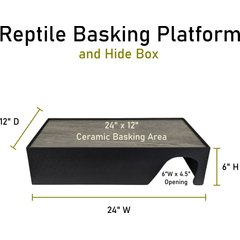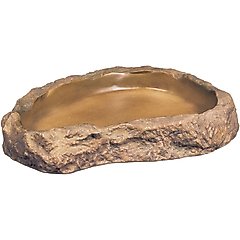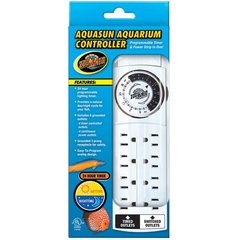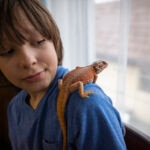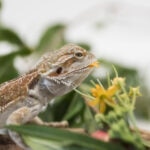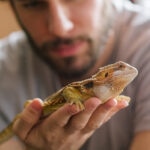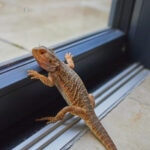Do Bearded Dragons Hibernate? All About Beardie Brumation
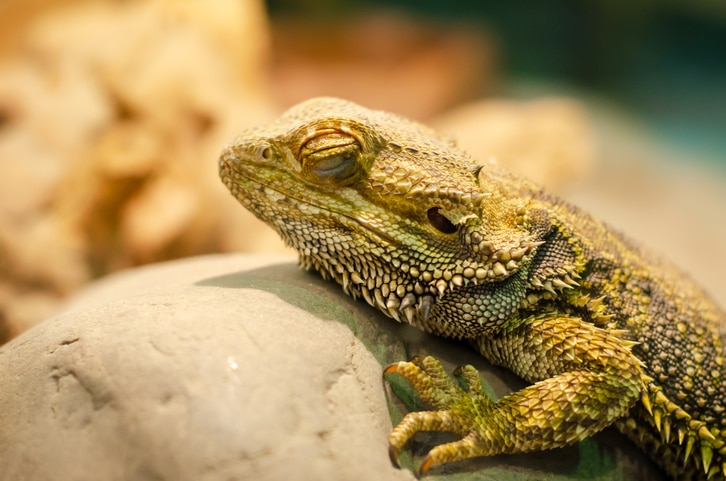
Photo by artas/iStock/Getty Images Plus
Wondering if your bearded dragon is having a little nap or in a state of hibernation?
It’s a fair question. Here’s how to understand brumation, including why it happens and how to take care of your beardie until they’re full awake again.
Key Takeaways
- Bearded dragons don’t hibernate, they brumate. It’s a natural rest period during colder months when their activity and appetite slow down.
- Healthy adult beardies may brumate on their own, but pet dragons shouldn’t be forced into it.
- Before and during brumation, reduce lighting and feedings, keep fresh water available, and monitor your dragon’s weight and health.
- Brumation out of season—or in sick or young dragons—may signal a problem, so contact an exotic reptile vet if you notice this.
Can Bearded Dragons Hibernate?
Bearded dragons don’t hibernate since they’re not mammals. Instead, bearded dragons enter brumation, which is a natural process similar to hibernation, says Austin Guinn, owner of Scorchin’ Scalies in Atlanta, Georgia.
In the wild, beardies brumate every year. However, pet bearded dragons may or may not brumate. Either way, Guinn says that brumation is “completely normal and not a reason for concern.”
Lasting anywhere from a few weeks to a few months, brumation is a survival tactic. It allows wild reptiles to snooze through cold weather and winter’s lack of food, coming out of their slumber when temperatures rise again.
What Are Signs of Brumation?
Because some beardies naturally enter brumation, even as pets, there will be signs to look out for. Learning to identify them is important to your scaly pal’s health.
Signs include:
- Slower or sluggish movements
- Decreased appetite
- Decreased activity, they may look like they’re sleeping
If you’re not sure whether this behavior is normal for your beardie, or you don’t believe it’s time for your beardie to brumate, schedule a visit with your beardie’s exotic veterinarian.
Why Do Bearded Dragons Brumate?
Reptiles like bearded dragons depend on the warmth of their environment for everything from digesting food to mating cycles.
So, those who live in areas with a cold winter evolved to survive it—by sleeping through it.
They find a safe, comfortable spot and slow down their heart, breathing, metabolism, and everything else, resting until the environment warms enough for them to be active again.
How To Take Care of Your Beardie Before Brumation
Even if wild bearded dragons brumate every winter, when nighttime temperatures drop low enough, that’s not necessarily true for pet beardies.
Denise Cieri, founder of HerpHaven Reptile Rescue and Sanctuary in Brunswick, Maine, explains that out of the 25 beardies she’s kept, only one went into a full brumation. “She stopped eating and started to spend more time in her hide and way less time basking,” she says.
Get a Vet Check
Cieri says you should have a fecal test done at your veterinarian’s office to check your dragon’s parasite load. It helps ensure your dragon is healthy enough to brumate—a dragon with too many parasites should first be treated for them because the strain parasites cause on the brumating body can be fatal.
Limit the Lights
While your beardie is getting ready to brumate, Cieri explains that you can also reduce the time the lights are on to mimic the change in daylight they would receive during winter months in the wild. Then, keep them lower during their brumation and gradually increase the lights when they would normally begin to awaken.
Reduce Feedings
She says that during the three to four weeks before your beardie starts a brumation cycle, gradually reduce their feedings.
Stop feedings one to two weeks before brumation to allow your beardie to digest all their food, because that food can rot in a brumating reptile’s stomach, causing all sorts of problems.
How To Take Care of Your Beardie During Brumation
Here’s how to keep them healthy during brumation. Keep in mind that it’s best to leave them alone as much as possible during this time, and you should never try to induce brumation on your own.
Get Them a Blackout Hut
Blackout huts and other shelters that simulate underground burrows can help a beardie feel safer while they brumate. However, they don’t need a specific type of hide—their normal hide is fine if there is enough space to curl up inside it.
Recommended Product
Leave Out Water
Brumating reptiles do not eat. They do sometimes poke their heads out and shift their positions, but during a brumation cycle, all of your beardie’s body cycles slow down, including their metabolism, heart rate, and breathing.
While some wild reptiles occasionally come out for a drink of water on warmer winter days, the cooler winter weather makes digesting their food impossible. So, other than leaving fresh water, your dragon should not have any food available.
Recommended Products
Keep Off the Lights and Heat…or Not
Cieri says that she turns off the lights and heat to simulate a cooler environment while her beardie is brumating.
However, Guinn leaves their normal lighting on in case they want to warm up.
There’s no consensus on what’s right or wrong here, so consider your individual home temperature.
Recommended Product
Realistically, it probably won’t get cold enough to be a real problem. So, whether you leave the heat on or off comes down to your preference and how cool your house gets—if it’s below 60 F or so, it might be nice to turn on a little heat.
Weigh Your Dragon
Weighing your beardie before, during, and after brumation gives you an idea how much of their body’s resources were used up in the process. If they look like they’re losing a lot of weight, a vet visit is in order.
Recommended Product
Keep an Eye on Them
Check on your dragon every day to make sure they’re still breathing and otherwise look healthy.
What To Do After Brumation
Bathe Your Dragon
Brumation often saps the body’s resources, so a warm bath when they wake up can help your dragon rehydrate.
Wake Up Your Beardie Gently
When your beardie starts waking up, make sure they have fresh water available, but wait a few days before offering food. If you’ve dialed down the light and heat, gradually increase it again. If your beardie seems weak or isn’t really waking up again, contact your veterinarian.
When To Call Your Beardie’s Vet
Even though brumation is natural, there are a few warning signs that your scaly pal needs to see their veterinarian:
- General color change, like becoming very pale or very dark, from their normal coloration
- Signs of dehydration, such as sunken eyes
- Excessive weight loss
- General weakness—their toes aren’t gripping as well, or they seem to struggle to raise their head
When Is Brumation an Emergency?
Here are a few situations to watch out for.
Your Bearded Dragon Is a Baby
When they’re a young lizard, all the food they eat goes toward growing. It doesn’t make sense to power down for a few weeks or months.
If your beardie is younger than 10 months and is showing signs of brumation, call your vet. Your beardie is likely too young to survive the process.
Your Bearded Dragon Is Sick
Just like young dragons, sick beardies should not brumate. Although natural, it’s hard on the body—just like mammals that hibernate, a beardie’s body still consumes calories, just not as many. They need those extra calories taken in via feedings to deal with their illness.
Your Beardie Is Brumating in the Summer
Brumation in the summer can indicate a health issue in your bearded dragon, or that the temperature or lighting is wrong in their tank. If they begin to brumate in the summer, reach out to your veterinarian immediately for advice.
FAQs About Bearded Dragon Hibernation
Can you stop your beardie from brumating?
No, you shouldn’t stop your beardie from brumating, but if your beardie is brumating when they’re not supposed to, you should call your veterinarian for advice.
Can baby beardies brumate?
No, baby beardies under the age of 10 months should not brumate. If they show signs of brumation, call your vet.
How do you know if your bearded dragon is still alive during brumation?
Brumation can be scary, but you can check on your dragon’s breathing. And, if you’re really worried, pick them up and try to place them on their back. Even though they’ll be sluggish, they should try to right themselves.
What month do bearded dragons brumate?
Pet beardies can brumate at any point, but wild dragons in Australia typically brumate during their winter, between May and August, or when temperatures are consistently around 50 F or lower.
How long do bearded dragons brumate?
Most pet bearded dragons brumate between four weeks and four months. In the wild, it’s dependent on the weather.
